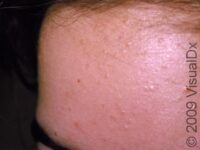Managing Acne Breakouts: Tips for Clearer Skin and Improved Self-Confidence
Acne is a common skin condition that many people experience but none want. The most common form is cystic acne, also known as acne vulgaris. This is an inflammatory type of acne that in some cases may leave scarring if left untreated.
Acne has various causes. For some individuals, it is genetic or related to hormonal changes. Other causes of acne include skin friction, certain medications, or occlusion of the skin by various personal care products.
To effectively handle cystic acne, make it your goal to develop an easy and appropriate skincare routine to treat the acne and minimize the scarring in the long run.
Common acne treatments include topical products containing benzoyl peroxide, salicylic acid, retinoids, or antibiotics ingredients aimed at reducing acne scars. Apart from topical antibiotics, many of these products are available over the counter.
You may effectively manage your cystic acne by taking the following steps:
1. Use the right regimen for you
Generally, it is ok to wash your face twice a day with lukewarm water. Washing more frequently or with scalding hot water may be more harmful than beneficial, as this tends to further irritate the skin.
There are many over-the-counter cleansers that are formulated for acne-prone skin. Because these are typically drying, it is helpful to follow this up with a non-comedogenic moisturizing lotion.
2. Avoid using occlusive or contaminated self-care products
Some ingredients found in cosmetics may irritate your skin and cause inflammation. Makeup applicators can harbor skin bacteria and should be cleaned routinely. Make sure to wash your face gently and cleanse all makeup residue with a mild, acne-friendly cleanser or soap.
When selecting makeup or skin care products, look for the phrase “non-comedogenic.”
3. Consider dermatological therapies
In some instances, severe acne cannot be managed by home remedies and may need to be seen by a dermatologist. These treatments should be done with the proper diagnosis and professional guidance and may need multiple and consistent dermatological visits before improvement is seen.
4. Consult your dermatologist
We always recommend checking in with your doctor before trying out any new products or treatments for your acne.
Proper diagnosis can save you so much time with the trial-and-error method of acne treatments and products. Plus, your dermatologist’s advice ensures your safety and protection from harmful acne treatments.
Ruth Riley is an educator, writer, and literary enthusiast. She contributes regularly at Motherhoodcommunity.com, W-Radiology.com, and CBDClinicals.com. By utilizing her expertise in teaching and writing, she wishes to educate more people and provide insight regarding their health and wellness concerns.
Last modified on July 6th, 2023 at 10:27 pm
